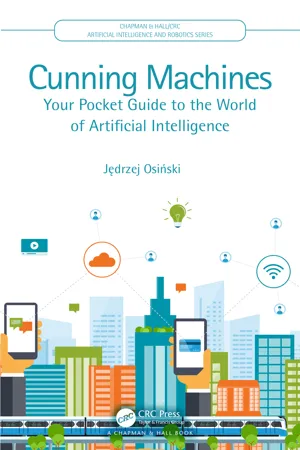
Cunning Machines
Your Pocket Guide to the World of Artificial Intelligence
- 169 pages
- English
- ePUB (mobile friendly)
- Available on iOS & Android
About This Book
There are many myths and mistakes which make the topics of artificial intelligence complex and confusing. But the truth is that the foundations of AI are not rocket science. People do not need a PhD to understand how a basic neural network works. In fact, one does not even need computer skills to learn this.
Cunning Machines: Your Pocket Guide to the World of Artificial Intelligence explains the main concepts: what does AI really mean, where do we find it, how do scientists try to evaluate it, what are its main limitations and what future we can expect with it? It also describes the most popular AI techniques in an easy-to-digest form:
-
- Artificial neural networks
-
- Genetic algorithms
-
- The Monte Carlo method
-
- Natural language processing
-
- Ontologies and their applications
This book is for everyone. Still, it may be especially valuable to teachers who wish to enrich their classes with some interesting and popular topics, sales managers and business analysts who wish to better understand the IT world, and finally politicians and journalists who take part in debates on the latest technologies.
J ?drzej Osi? ski earned a PhD in artificial intelligence, has worked on government grants and has published 14 scientific papers to date. He is also the co-author of two books. At the same time, he has over ten years of experience working in IT companies of different sizes, domains (the web, telecoms, banking, e-learning), organisation structures and locations (Poland, Ireland and the UK). He is also involved in various initiatives promoting AI, science and modern technologies including blog posts, invited talks and TV and radio appearances
Frequently asked questions
Information
Table of contents
- Cover
- Half-Title
- Series
- Title
- Copyright
- Dedication
- Contents
- Scientific Manifesto
- Author
- CHAPTER 1 • Introduction: Magic Revealed
- CHAPTER 2 • Artificial Intelligence: A Sci-Fi Phrase That Changed the World
- CHAPTER 3 • Neural Networks – A Brainstorm inside a PC
- CHAPTER 4 • Genetic Algorithms: From the Galapagos Islands to a Computer-Composed Symphony
- CHAPTER 5 • Monte Carlo Method: An Unexpected Benefit of Gambling
- CHAPTER 6 • Language Processing: Plato and Expert Systems
- CHAPTER 7 • A Future with Artificial Intelligence
- CHAPTER 8 • Final Thoughts
- INDEX